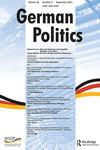Electoral Competition and Policy-Making Under the Fourth Merkel Government. Driven by ‘Fridays for Future’ and the Pandemic?
IF 2.1
3区 社会学
Q2 POLITICAL SCIENCE
引用次数: 0
Abstract
Did electoral competition shape the policies of the fourth Merkel government? We answer this question in five steps. First, we theoretically discuss under which conditions electoral competition affects public policies. Only in publicly salient issue areas in which opposition parties advocate credible alternatives and only if policy satisfaction influences voting intention will the government modify its policies. Next, we identify the two most salient issue areas, climate change and the Corona pandemic. Third, opposition parties offered credible alternatives, the Greens (and the Left) in climate policy and the FDP (and the AfD) regarding Corona management. Fourth, governing parties could not be certain to participate in the next government. Furthermore, voting intention for the Christian democrats as leading party of the government was related to policy success, while the Greens (and the Left) and the FDP (and the AfD) could benefit from dissatisfaction with climate change policy and Corona management, respectively. Finally, only regarding climate change did the government respond to electoral pressure by an increase in press releases, while communication about Corona was driven by voters' problem perception. These findings are corroborated by brief case studies of policy-making processes. [ FROM AUTHOR] Copyright of German Politics is the property of Routledge and its content may not be copied or emailed to multiple sites or posted to a listserv without the copyright holder's express written permission. However, users may print, download, or email articles for individual use. This may be abridged. No warranty is given about the accuracy of the copy. Users should refer to the original published version of the material for the full . (Copyright applies to all s.)第四届默克尔政府时期的选举竞争与政策制定。受“未来的星期五”和大流行病的驱动?
选举竞争是否影响了默克尔第四届政府的政策?我们分五个步骤回答这个问题。首先,我们从理论上讨论了选举竞争在何种条件下影响公共政策。只有在反对党主张可信替代方案的公开问题领域,只有在政策满意度影响投票意向的情况下,政府才会修改其政策。接下来,我们确定两个最突出的问题领域,气候变化和冠状病毒大流行。第三,反对党提供了可信的替代方案,绿党(和左翼)在气候政策方面,自由民主党(和AfD)在科罗纳管理方面。第四,执政党不一定会参与下届政府。此外,基督教民主党作为政府领导党的投票意向与政策的成功有关,而绿党(和左翼)和自由民主党(和AfD)可能分别从对气候变化政策和科罗纳管理的不满中受益。最后,只有在气候变化方面,政府才通过增加新闻稿来应对选举压力,而关于科罗纳的沟通是由选民的问题认知驱动的。这些发现得到了政策制定过程的简短案例研究的证实。[发件人]《德国政治》版权归劳特利奇所有,未经版权持有人明确书面许可,不得将其内容复制或通过电子邮件发送到多个网站或发布到listserv。但是,用户可以打印、下载或通过电子邮件发送文章供个人使用。这可能会被删节。对复印件的准确性不作任何保证。用户应参考材料的原始发布版本以获取完整信息。(版权适用于所有人。)
本文章由计算机程序翻译,如有差异,请以英文原文为准。
求助全文
约1分钟内获得全文
求助全文

 求助内容:
求助内容: 应助结果提醒方式:
应助结果提醒方式:


